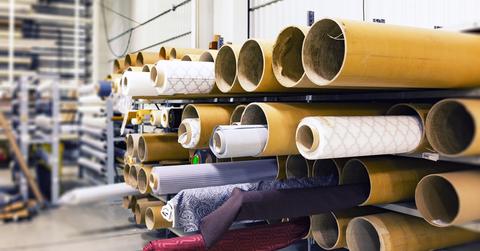The Fashion Industry Turns To Produce To Create Sustainable Fabrics
We've grown oddly attached to a few specific fabrics that unfortunately also rank worst for environmental profiles. The fashion industry is firing back by turning to produce in order to solve some style-related, environmental woes.
Updated May 21 2019, 4:41 p.m. ET
The fashion industry is turning cutting edge with more than trends and style. Startups and established brands are now looking to fruit and vegetable-based materials in order to solve some style-related, environmental woes.
Our culture has grown oddly attached to a few specific fibers like cottons and wools for our clothes that unfortunately also rank worst for environmental profiles. Ignoring repercussions to the natural world or the animals raised for our textiles, the fashion industry has answered consumers' calls and produced for us. But that's created a bad track record for the industry: by hurting farmland, disturbing the health of producers and manufacturers, and polluting rivers with dyes, bleaches, detergents and toxic solvents.
Now, the same industry is looking for answers—and not from cottons that rely on pesticides and water, polyesters made from petroleum, or the literal hides of farm animals. Innovators are now looking at fibers produced from less likely but far more sustainable sources.
New businesses are being rewarded for forward thinking.
Fashion for Good and Plug and Play teamed up to launch a three-month innovation accelerator that locates and invests in new businesses utilizing sustainable design in the fashion industry. Selected startups receive 12 weeks of free office space, funding, mentorship, networking and potential venture capital sources. Plug and Play’s latest winners, which were focused on low-impact, fashion-industry innovations, demonstrate ingenuity going way beyond the fabrics we’re used to, instead offering sustainable alternatives we can be proud to wear.
And a few of them utilize two plants you might never thought of wearing: mushrooms and pineapples.
New textiles are being found by tapping into the fungus among us.
Mushrooms make for great textiles—and, apparently, leather stand-ins. Mycelium, the vegetative part of a fungus, is made of a mass of branched hyphae very threadlike in nature. That makes mushrooms great options for fabrics. Plug and Play took special notice of MycoTex, a mushroom textile, and Amadou, a “leather” made from the skin of amadou mushrooms.
MycoTEX was the brainchild of Aniela Hoitink, who after graduating from the Utrecht School of Arts sought to create a textile from living materials. She set about mixing mycelium with textiles, resulting in flexible products that grow themselves to size. When the wearer is done with a garment, the whole thing can be composted.
Pineapples offer an express route to eco-fashion.
Netherlands-based startup Agraloop is turning fibrous food waste from banana, flax, hemp and pineapple into textiles. That startup is doing similar work to Pinatex, which focuses on pineapple-production waste, and Bourgeois Boheme’s sale of shoes made from pineapple instead of leather.
Fruit and fungus are just the tip of the proverbial iceberg.
Mushroom boots and pineapple jackets are just the beginning. Utilizing waste from other industries such as the pineapple market means no additional resources such as water, pesticides, fertilizers or land are diverted for production. And that means the cotton industry— currently accounting for a third of all fiber in the textile industry—may be approaching a slump. Hemp, pineapples, mushrooms, and even bananas and coconuts may be due for a nice, big seat at the textile table.
